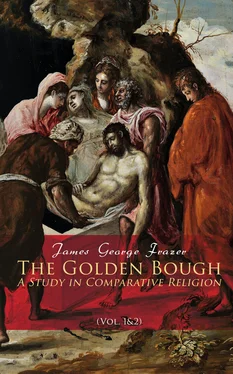As the object of the royal taboos is to isolate the king from all sources of danger, their general effect is to compel him to live in a state of seclusion, more or less complete, according to the number and stringency of the taboos he observes. Now of all sources of danger none are more dreaded by the savage than magic and witchcraft, and he suspects all strangers of practising these black arts. To guard against the baneful influence exerted voluntarily or involuntarily by strangers is therefore an elementary dictate of savage prudence. Hence before strangers are allowed to enter a district, or at least before they are permitted to mingle freely with the people of the district, certain ceremonies are often performed by the natives of the country for the purpose of disarming the strangers of their magical powers, of counteracting the baneful influence which is believed to emanate from them, or of disinfecting, so to speak, the tainted atmosphere by which they are supposed to be surrounded. Thus in the island of Nanumea (South Pacific) strangers from ships or from other islands were not allowed to communicate with the people until they all, or a few as representatives of the rest, had been taken to each of the four temples in the island, and prayers offered that the god would avert any disease or treachery which these strangers might have brought with them. Meat offerings were also laid upon the altars, accompanied by songs and dances in honour of the god. While these ceremonies were going on, all the people except the priests and their attendants kept out of sight.495 On returning from an attempted ascent of the great African mountain Kilimanjaro, which is believed by the neighbouring tribes to be tenanted by dangerous demons, Mr. New and his party, as soon as they reached the border of the inhabited country, were disenchanted by the inhabitants, being sprinkled with “a professionally prepared liquor, supposed to possess the potency of neutralising evil influences, and removing the spell of wicked spirits.”496 In the interior of Yoruba (West Africa) the sentinels at the gates of towns often oblige European travellers to wait till nightfall before they admit them, the fear being that if the strangers were admitted by day the devils would enter behind them.497 Amongst the Ot Danoms of Borneo it is the custom that strangers entering the territory should pay to the natives a certain sum, which is spent in the sacrifice of animals (buffaloes or pigs) to the spirits of the land and water, in order to reconcile them to the presence of the strangers, and to induce them not to withdraw their favour from the people of the land, but to bless the rice-harvest, etc.498 The men of a certain district in Borneo, fearing to look upon a European traveller lest he should make them ill, warned their wives and children not to go near him. These who could not restrain their curiosity killed fowls to appease the evil spirits and smeared themselves with the blood.499 In Laos before a stranger can be accorded hospitality the master of the house must offer sacrifice to the ancestral spirits; otherwise the spirits would be offended and would send disease on the inmates.500 In the Mentawej Islands when a stranger enters a house where there are children, the father or other member of the family takes the ornament which the children wear in their hair and hands it to the stranger, who holds it in his hands for a while and then gives it back to him. This is thought to protect the children from the evil effect which the sight of a stranger might have upon them.501 At Shepherd's Isle Captain Moresby had to be disenchanted before he was allowed to land his boat's crew. When he leaped ashore a devil-man seized his right hand and waved a bunch of palm leaves over the captain's head. Then “he placed the leaves in my left hand, putting a small green twig into his mouth, still holding me fast, and then, as if with great effort, drew the twig from his mouth—this was extracting the evil spirit—after which he blew violently, as if to speed it away. I now held a twig between my teeth, and he went through the same process.” Then the two raced round a couple of sticks fixed in the ground and bent to an angle at the top, which had leaves tied to it. After some more ceremonies the devil-man concluded by leaping to the level of Captain Moresby's shoulders (his hands resting on the captain's shoulders) several times, “as if to show that he had conquered the devil, and was now trampling him into the earth.”502 North American Indians “have an idea that strangers, particularly white strangers, are ofttimes accompanied by evil spirits. Of these they have great dread, as creating and delighting in mischief. One of the duties of the medicine chief is to exorcise these spirits. I have sometimes ridden into or through a camp where I was unknown or unexpected, to be confronted by a tall, half-naked savage, standing in the middle of the circle of lodges, and yelling in a sing-song, nasal tone, a string of unintelligible words.”503 When Crevaux was travelling in South America he entered a village of the Apalai Indians. A few moments after his arrival some of the Indians brought him a number of large black ants, of a species whose bite is painful, fastened on palm leaves. Then all the people of the village, without distinction of age or sex, presented themselves to him, and he had to sting them all with the ants on their faces, thighs, etc. Sometimes when he applied the ants too tenderly they called out “More! more!” and were not satisfied till their skin was thickly studded with tiny swellings like what might have been produced by whipping them with nettles.504 The object of this ceremony is made plain by the custom observed in Amboina and Uliase of sprinkling sick people with pungent spices, such as ginger and cloves, chewed fine, in order by the prickling sensation to drive away the demon of disease which may be clinging to their persons.505 With a similar intention some of the natives of Borneo and Celebes sprinkle rice upon the head or body of a person supposed to be infested by dangerous spirits; a fowl is then brought, which, by picking up the rice from the person's head or body, removes along with it the spirit or ghost which is clinging like a burr to his skin. This is done, for example, to persons who have attended a funeral, and who may therefore be supposed to be infested by the ghost of the deceased.506 Similarly Basutos, who have carried a corpse to the grave, have their hands scratched with a knife from the tip of the thumb to the tip of the forefinger, and magic stuff is rubbed into the wound,507 for the purpose, no doubt, of removing the ghost which may be adhering to their skin. The people of Nias carefully scrub and scour the weapons and clothes which they buy, in order to efface all connection between the things and the persons from whom they bought them.508 It is probable that the same dread of strangers, rather than any desire to do them honour, is the motive of certain ceremonies which are sometimes observed at their reception, but of which the intention is not directly stated. In Afghanistan and in some parts of Persia the traveller, before he enters a village, is frequently received with a sacrifice of animal life or food, or of fire and incense. The recent Afghan Boundary Mission, in passing by villages in Afghanistan, was often met with fire and incense.509 Sometimes a tray of lighted embers is thrown under the hoofs of the traveller's horse, with the words, “You are welcome.”510 On entering a village in Central Africa Emin Pasha was received with the sacrifice of two goats; their blood was sprinkled on the path and the chief stepped over the blood to greet Emin.511 Amongst the Eskimos of Cumberland Inlet, when a stranger arrives at an encampment, the sorcerer goes out to meet him. The stranger folds his arms and inclines his head to one side, so as to expose his cheek, upon which the sorcerer deals a terrible blow, sometimes felling him to the ground. Next the sorcerer in his turn presents his cheek and receives a buffet from the stranger. Then they kiss each other, the ceremony is over, and the stranger is hospitably received by all.512 Sometimes the dread of strangers and their magic is too great to allow of their reception on any terms. Thus when Speke arrived at a certain village the natives shut their doors against him, “because they had never before seen a white man nor the tin boxes that the men were carrying: ‘Who knows,’ they said, ‘but that these very boxes are the plundering Watuta transformed and come to kill us? You cannot be admitted.’ No persuasion could avail with them, and the party had to proceed to the next village.”513
Читать дальше












